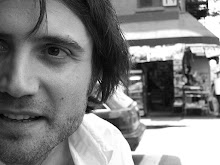
Knowing that I would have plenty of reading time over the next month (numerous flights and overnight trains) I bought this after I read the initial NY Times review of it, not realizing an even more full length review was to come out in the Sunday edition of the paper.
I'm midway through its hefty 450 pages of text and over 100 pages of notes and deeply impressed and inspired. Robin D.G. Kelly put in an extraordinary amount of research into this and takes on Monk's story with honesty, love, and compassion, through which he gained an unprecedented level of trust and closeness with the Monk family (including his wife Nellie before her recent death). The story of Monk and Nellie's ancestry is a deep portrait of slavery and the oppression of blacks in the South, which didn't end with the migration of Monk's family to the North and the days of living in San Juan Hill (now the ritzy area around Lincoln Center), and would follow Monk into much of his career. But not only is this a story of deep struggle, but also an incredible sense of pride and triumph. Monk's mother toiled as a cleaning woman for years in order to support her kids (including Monk through much of his twenties), and Nellie would do the same for many years until Monk's music began to bring steady income to the family. Despite early hardship, joblessness, and countless negative reviews, Monk never sacrificed his artistry and having learned some harsh lessons about the music business early on (his estate still only receives 1/3 of the royalties from "Round Midnight" due to Monk entrusting his publishing to others) he never allowed promoters, labels, and club owners to push him around.
It's an incredible portrait of the jazz scene from the forties into the seventies, and of musicians and others who lived by their own set of rules. Monk would have an incredible musical influence over the course of his lifetime. The number of musicians who he taught and who passed through his bands is staggering. Anybody who played with Monk had to be taught his music by ear, often in the studio or on the gig, resulting in numerous apprenticeships that would shape giants such as John Coltrane, Sonny Rollins, Roy Haynes, and Steve Lacy.
As talked about in both reviews, the book also dispels much of the mystique surrounding Monk, and is a beautiful story of a lifelong love and devotion between Monk and Nellie, as well as Monk and his two children and extended family. He actively took a part in the well being of countless others, and donated his artistry numerous times to a number of civil rights organizations over the years. Monk did struggle with what would now most likely be diagnosed as manic depression and some horribly misguided treatments, not to mention his own alcohol abuse and occasional drug use, all of which took a toll on him. Still, he managed to persevere into the last decade of his life, leaving a legacy that has been paralleled by few artists in history.
I hope books such as this continue to raise the level of scholarship in jazz. Kelly undoubtebly went the extra mile to get the truth, making many sacrifices of his own along the way. I think any lover of Monk owes him an incredible degree of gratitude for his work.





No comments:
Post a Comment